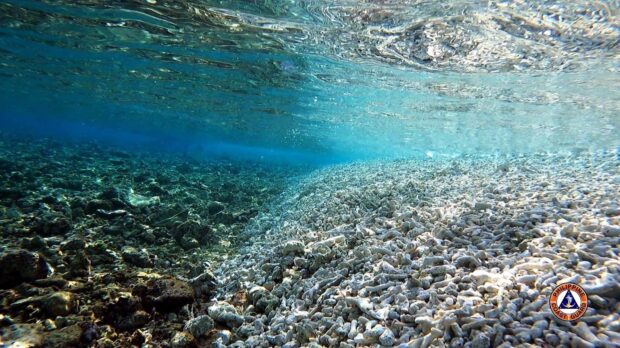Gov’t taps experts to verify reef damage

SORRY SIGHT | A recent survey conducted by the Philippine Coast Guard (PCG) in Escoda (Sabina) Shoal in the West Philippine Sea shows the destruction of the coral bed in the area, which has been blamed on the Chinese. (Photo from the Philippine Coast Guard)
MANILA, Philippines — The Philippine Coast Guard (PCG) said it has reached out to marine experts from the University of the Philippines to study samples of destroyed corals in an area frequented by Chinese maritime militia in the West Philippine Sea so the government can establish a clearer picture of what happened there.
Nevertheless, Justice Secretary Jesus Crispin Remulla said, also on Tuesday, that he would recommend to Malacañang the filing before the international tribunals of cases against China over alleged harvesting and destroying coral reefs in the West Philippine Sea.
In an interview at “Bagong Pilipinas Ngayon” aired on state television on Tuesday, PCG spokesperson Jay Tarriela said the agency had requested the assistance of the UP Marine Science Institute (UP-MSI) to ascertain the death of corals at Escoda (Sabina) Shoal and Rozul (Iroquois) Reef and to study samples of dead corals gathered from Escoda.
Video taken by PCG personnel at Escoda showed that live corals had disappeared and were replaced by crushed and bleached ones.
To be validated
“What is puzzling is that at Escoda Shoal, the cleaned and processed corals were dumped again. [The video] doesn’t explain why they harvested them and dumped them back again,” Tarriela said.
Defense Secretary Gilberto Teodoro Jr. also said the reported coral destruction needed to be validated if it was linked to possible reclamation activities.
“We have to validate because according to the Arbitral Award, it’s a violation of the international treaty, the destruction of maritime livelihood particularly if the coral destruction is a cause of, or used for reclamation of artificial islands,” he told reporters in Clark Freeport, where he attended the turnover of a surveillance aircraft from the United States to the Philippine Air Force on Tuesday.
Gathering evidence
The Armed Forces of the Philippines and the PCG were still gathering evidence on whether the presence of Chinese vessels near Escoda and Rozul was linked to the destruction of coral reefs.
“We have to validate it and then we’ll coordinate with the Department of Foreign Affairs so that we can file the appropriate action,” Teodoro said.
On fears that the destruction of the corals at Escoda and Rozul could be a prelude to reclamation activities by China, as raised by some senators, Tarriela said: “We don’t want to speculate. We believe that we need the expertise of our marine scientists to really explain what is happening, why [the] cleaned and processed corals are dumped once again in Escoda Shoal.”
He said the PCG had submitted its report on the incident to the National Task Force on the West Philippine Sea. He added that the Bureau of Fisheries and Aquatic Resources and the UP-MSI could assess the cost of damage to the corals at Escoda and Rozul.
For his part, Remulla said, “We are recommending the filing of such cases against the perpetrators of this evil act, which is the destruction of the environment.”
The justice chief said he would discuss the matter with Executive Secretary Lucas Bersamin.
“With or without a territorial dispute, the destruction of the environment is a sin against humanity,” Remulla added.
He noted that the destruction of the coral reef in the West Philippine Sea has been happening for many years.
“We believe it can be done. We will pursue these cases against China because it’s no longer acceptable. We have a lot of evidence,” he added.
Because of this, the justice secretary pointed out it’s a very strong case to file on behalf of the Philippines “for the sake of humanity itself.”
‘Troubling’
On Monday, US Ambassador to the Philippines MaryKay Carlson took to X (formerly Twitter) to assure its treaty ally that Washington was working to protect the country’s resources.
“Troubling … reports on coral destruction around Rozul Reef and Escoda Shoal. Habitat damage harms ecosystems and negatively affects lives and livelihoods,” Carlson said.
While Carlson never mentioned China’s supposed involvement in the issue, she said “we are working with our [friends, partners and allies] to protect [the Philippines’] natural resources.”
Japanese Ambassador to the Philippines Koshikawa Kazuhiko shared Tokyo’s similar experience with China from 10 years ago.
“In the territorial waters [and] EEZ (exclusive economic zone) around Japan’s Ogasawara Islands, a large-scale poaching of precious corals by foreign vessels occurred 10 years ago, causing marine environmental [and] economic [damage] to Japan, leading to diplomatic issue and strict JCG (Japanese Coast Guard) controls,” Kazuhiko said in a post on X on Monday.
According to the Japanese Ministry of Foreign Affairs, at least 200 Chinese coral vessels were spotted in the vicinity of Ogasawara from September to December 2014. Many of these ships were harvesting corals as well, which led to the arrest of at least 10 Chinese captains and to the filing of several diplomatic protests against Beijing.
—WITH REPORTS FROM TINA G. SANTOS AND JACOB LAZARO
For comprehensive coverage, in-depth analysis, visit our special page for West Philippine Sea updates. Stay informed with articles, videos, and expert opinions.